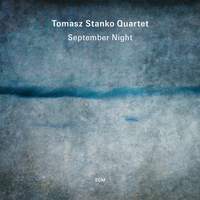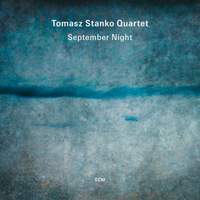Recording of the Week,
Tomasz Stańko Quartet - September Night

When Tomasz Stańko passed away from lung cancer in 2018, it was as if a light had gone out in the jazz world, abruptly marking the transition from day to night.
The live recording of Stańko’s September Night, recorded at Munich's Muffathalle two decades ago in 2004, captures an atmospheric and emotive live performance bringing the trumpeter's oeuvre from around that period to life. Centred on the material his Polish quartet had been developing in recent years, this album features the nuanced interplay of their acoustic instruments, symbolising a broader theme of change and introspection during the maestro's career.
Stańko’s trumpet playing, renowned for its lyrical and emotive qualities, leads the musical narrative, conveying the contemplative and serene essence of that autumn crepuscule in Munich. Throughout the set, his quartet evokes the cool, crisp air and the quiet stillness, inviting listeners to pause and reflect on their own experiences and emotions as they resonate with the world around us. The album’s tone is meditative, seemingly seeking to connect the external environment with Stańko’s innermost thoughts and feelings. Meanwhile, the ambient sounds of the venue are captured in its hearty reverb, enhancing the immersive experience of the warm recording and providing us with an authentic sense of being present there ourselves, all these years later.

Over the course of his lifetime, the Slavic jazz musician and composer stood as a leading light, one whose profession resonated with profound emotional depth and innovative spirit. Born in Rzeszów on 11th July, 1942, Stańko's career spanned over five decades, during which he became an influential figure in both the European and international jazz scenes. His trumpet was his voice, a hauntingly beautiful instrument capable of conveying the full spectrum of human emotion. His sound was characterised by its devastating blend of melancholy and hope, and the raw intensity of their juxtaposition. He drew inspiration from a wide array of sources, including the avant-garde movement, traditional Polish music and the inventory of American post-bop.
Stańko's line of work was marked by his fearless exploration of new musical territories. His album Balladyna, released in 1976 on the ECM label, was a groundbreaking fusion of free jazz and Slavic folk melodies. In later years, albums such as Soul of Things (2002) and Suspended Night (2004) further solidified his reputation as a master of atmospheric, introspective expression. Despite his global acclaim, Stańko remained deeply connected to his Polish roots. He nurtured a new generation of talent, often collaborating with younger musicians from his homeland. Safe to say, they feature here each having picked up the ephemeral steps of their leader's choreography.
Tomasz Stańko departed leaving behind a legacy of music that continues to echo in the hearts of listeners worldwide. His trumpet, like a solitary voice in the night, remains a symbol of the beauty and complexity of the human spirit. As a pioneer and poet of jazz, Stańko’s legacy is etched in the air; a symphony of echoes that will linger long after the final note fades into the next twenty years and beyond. Much like a lighthouse shrouded by fog, his trumpet still guides us through the mist of our own uncertainties, illuminating the path with the soft glow of his life-affirming artistry.
Available Formats: CD, MP3, FLAC/ALAC/WAV, Hi-Res FLAC/ALAC/WAV




